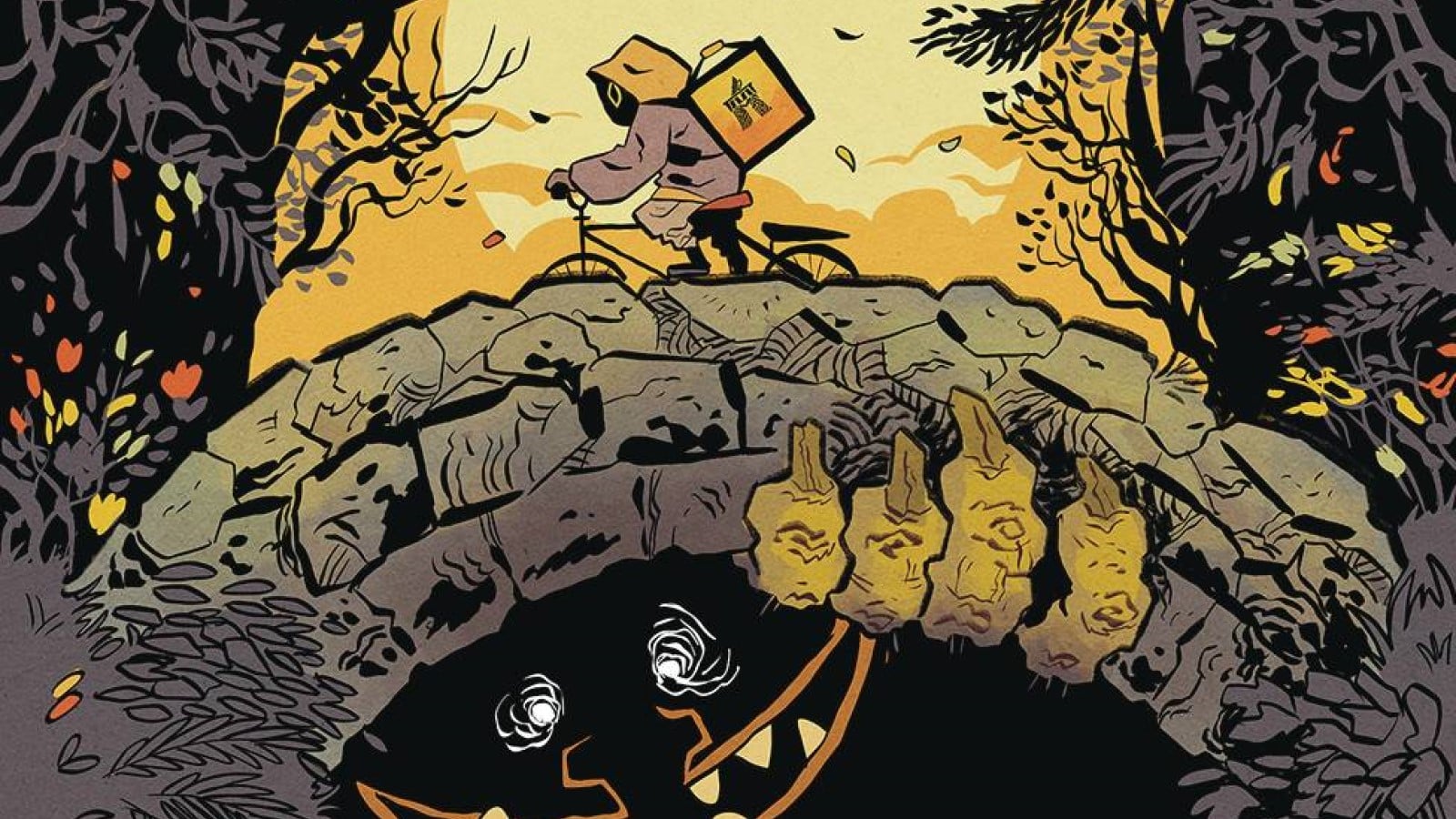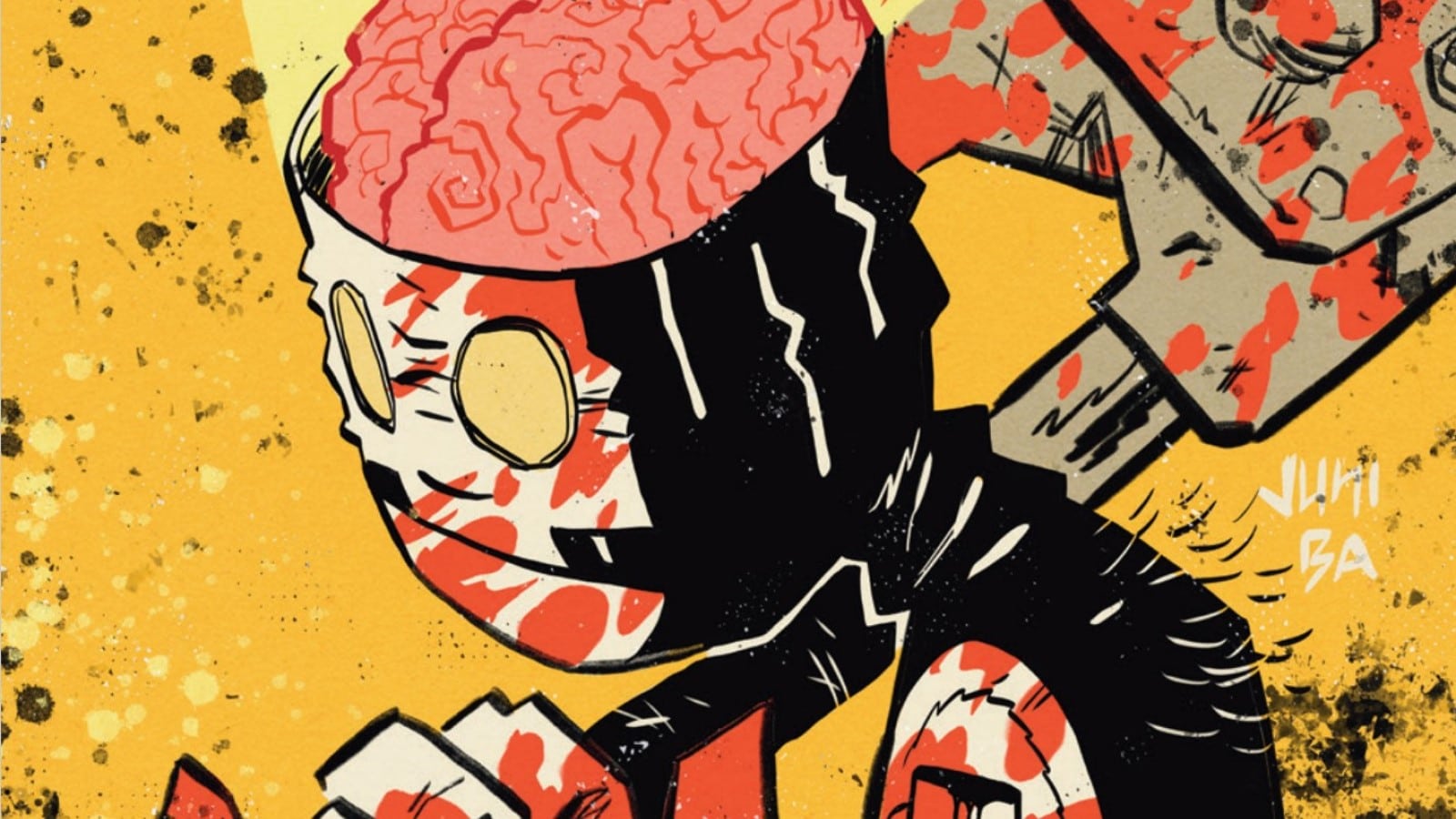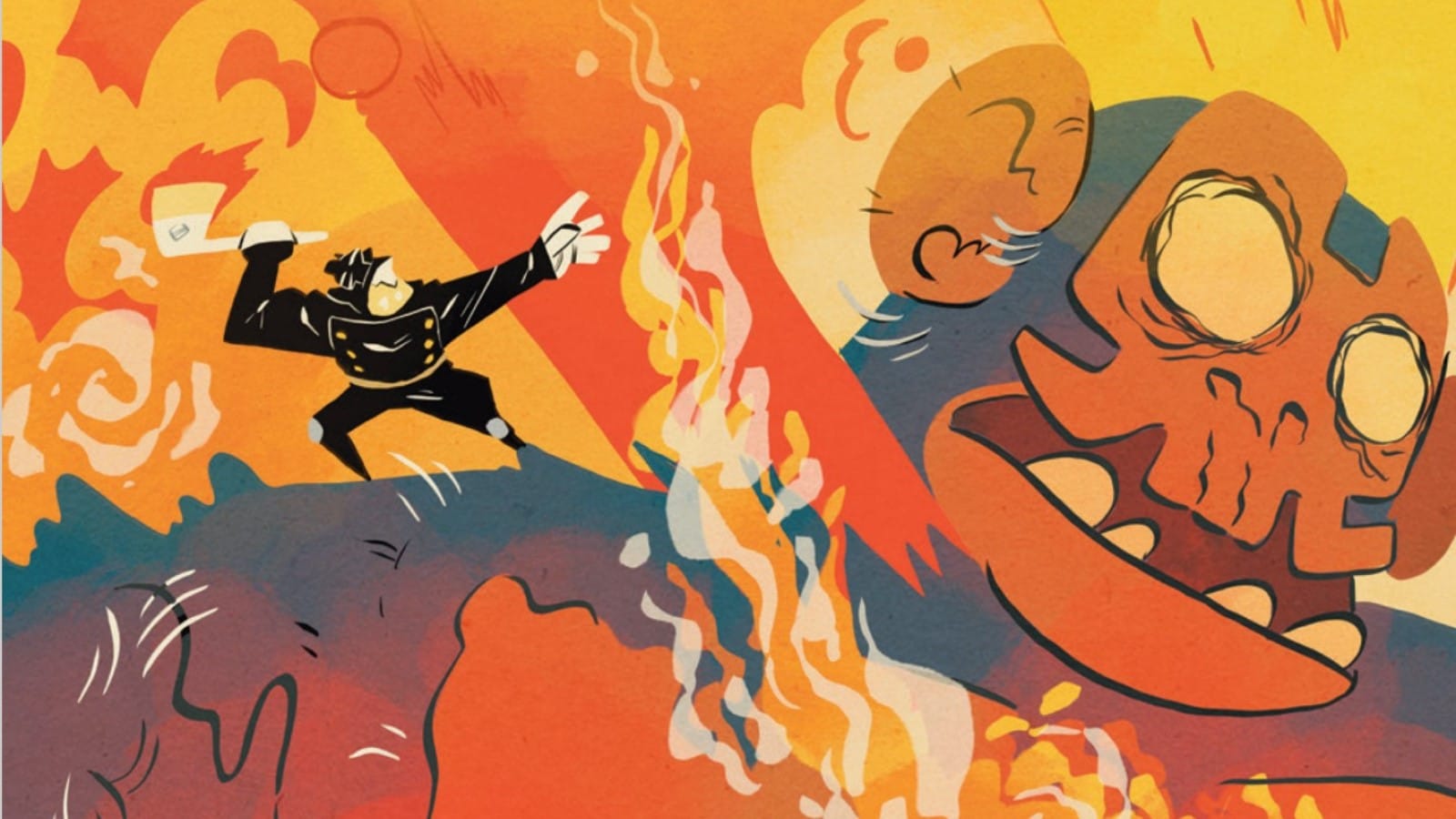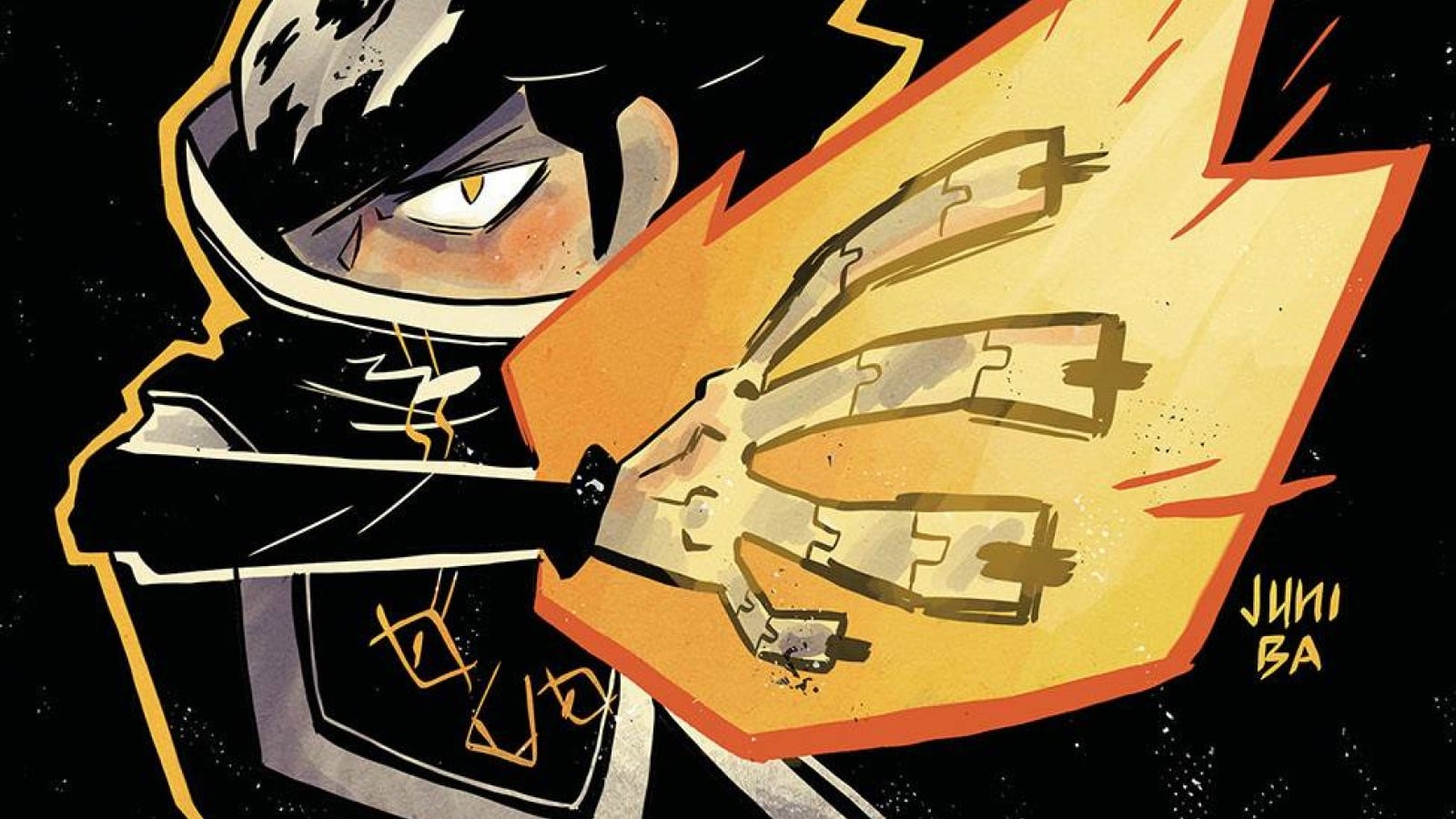A delivery boy bears a most important package, and will let nothing stop him from bringing it to his destination. The only thing standing in his way? A large troll, and a bridge on which no living soul may set foot. Monkey Meat #3 is a Juni Ba creation (with special authorization from the Monkey Meat Company).
Armaan Babu: I know it’s only been two issues, but I’d gotten used to the wretched yet humorous tone of Monkey Meat. This fantasy fable is a departure from that, though I can’t say I’m complaining. Can’t say we weren’t warned, though — the very first sentence of this issue tells us it ends well. Can you blame me for not trusting our storyteller, though?
Ritesh Babu: Haha. Yeah. Though at the same time, it’s only really a “good ending” relative to all the outcomes and narratives of the Monkey Meat corporation. But yeah, I was pleasantly surprised by how this fared.
Comfort Is Not Transactional

Armaan: So putting aside all of the capitalist criticism that makes the book, this issue functions pretty well as its own children’s tale. It’s a good fantasy fable, it’s got all the classic elements. A young protagonist; a dark, scary monster; magical, arbitrary rules; and clever loopholes getting us a happy(ish) ending. I feel well fabled.
Also, I’m enjoying the return to color. Last month’s black, white and yellow was good for what it was going for, but even though black and yellow continue to be pretty predominant here, the colors just enrich the whole experience in very pleasant ways. What did you think?
Ritesh: The framing of the narrative fascinates me. There’s that bit wherein the captions (by Karl, our storyteller here) says, “Until the day came for him to deliver a package so important, it would make up for all his years of suffering,” and by the end of the story, you even get our lead character, the coursier, grinning. He’s content. He’s satisfied. He’s done it.
It is a “good ending,” certainly, especially given a number of other possibilities. But it’s the kind of good ending that’s just utterly horrifying. It’s like when you read those uplifting headlines or news about kids banding together and learning to do the impossible tasks in their broken communities. It’s like, sure. But they shouldn’t have to. The government should be doing that, it shouldn’t fall to these children. What the hell are these adults doing? This isn’t uplifting. This is horrifying. This is exposing the painfully broken system which normalizes itself through tales like these. It shouldn’t be the norm, it should not be accepted. But those are the terms that have been accepted, which the Monkey Meat corporation has gotten everyone, God included, to sign off on as totally acceptable.
So when I read those captions and see that boy’s smile at the end, and mull over the words that this act makes up for all his years of suffering. The narrative of that, the story being told there, the story we tell ourselves in order to make meaning, to make some sense of our suffering, that breaks my heart. Because the truth is? Nothing makes up for all those years of suffering, not really. It’s not a trade deal in business. That’s not how that works. But it is the story people like to hear, and it is the story the boy needs to tell himself to keep going, and it’s a story that rings all too real. The idea of suffering as being meaningful, as being “worth it” in some capacity in pursuit of an oncoming final goal. It saddens me, because I’ve seen that in life and known that in life.
Armaan: I think I would have been seeing things a bit more your way if it wasn’t for the way this story was told. An entertaining, childish fable. You’re right — there’s nothing that really makes the kinds of things spoken about this comic worth it. There’s no balancing the scales for some wrongs. But we grab comfort where we can to be able to face another day, and I don’t think anyone knows that more than our friend Lug, to whom this story’s being told.
The boy might have thought his sacrifice a balancing of scales of a sort, but I don’t know if Lug would have seen the same. It is, however, a nice story — and whether it’s in this comic or life itself, it’s hard to know when you’re going to get another one of these.
Let’s talk about our coursier himself, though, for a bit.
He’s introduced as a changeling. A kid taken by the fae as a child, raised in a culture that he was not born to or fated for, before being thrown back into that world, never quite fitting into either. Cards on the table, as someone who spent his childhood in America but grew up in India and has never quite fit into either country, I projected a lot of myself onto this kid. Much more than the text would indicate — I had a pretty great childhood, grew up with none of the scars the story says he grew up with. I didn’t suffer. But my heart went out to him, all the same.
Ritesh: Yeah, I definitely see that. It’s very much understandable. I’m certainly seeing a lot of myself here as well, because I did have a really traumatic, awful childhood, and I used to tell myself a lot, “If I just …” and it would always be this act or goal to accomplish, that when I did, it would make all this shit retroactively OK and worth it. But then you realize that’s never going to happen. You just gotta carry on, carrying the weight of everything, just like before.
But also, I absolutely understand his contentment and relief. He saved someone from going through what he did. He stopped the existence of another him, even if for just a moment. Even if it’s just one person, he prevented another soul from his own torment. And that in itself is a reward. I definitely get that, and there is a profoundly moving tale there. It rings rather right.
You’re right on the comfort part. The act itself, and the idea of a resilient human spirit that in the face of all this mess can do this, snatch a small win, even if it’s minuscule and tiny, it’s moving and potent. It is hard not to smile, in that sense. And it’s perhaps why I appreciate this book so much. It is telling the kind of classic children’s fable we all hear and grow up with, the kind we like and love, but it’s also contextualizing it in all the ways we hit on the above. The reason the bridge and the troll that doom things for our hero exist? Monkey Meat. The whole damn place’s government? Monkey Meat. In the end, the “price” of giving the baby back, beyond the boy’s life, involves a goddamn Monkey Meat TV subscription. God knows this isn’t the first time this has ever happened. The boy is testament to that truth. But the Monkey Meat corporation doesn’t care. If anything, they likely prefer this outcome, for they probably think it leads to useful employees.
So it takes those classic kid’s adventure fables and contextualizes them in very tangible ways that I quite dig. It works on a number of levels.
The Boy, the Troll and a Bridge for the Unliving

Armaan: So we’ve spoken of the framing, this story’s beginning and end. Let’s dive into the story’s main struggle and get to our troll, because like the action sequence last issue, here is where Ba’s artwork really gets to shine, making his mark on the page like no one else can.
Our first full look at the troll has him absolutely dominating the page. Wild, rough, shadowy hair breaking out of the panel, gross, wicked and unkempt, menace just radiating off of this figure. Knull himself would be jealous of how threatening the troll’s dark hair is, how out of control it is as it eats up the panel borders around it. This is an absolute damned monster, and no one’s happier about it than he is.
We move from the softer colors of a pleasant, fairytale world to the intense molten yellows Ba’s enjoyed playing with in this series. You can almost feel the heat rising off the page, the intensity of a monster who revels in what he is, of being the strongest and scariest thing around.
What happens here is … honestly, less of a fight and more of a reinforcement of just how immovable an object the troll is. We see the boy use trickery, we see him magic up some explosions, we get a delightful little montage that shows us glimpses of the spells the boy cast, over several days, whose purposes we can only guess at, but all of it for naught. Time and time again, the boy’s attempts are to no avail.
I love the shaky lines Ba gives his action sequences. Mix that with the vividness of the colors, and it always looks like the page is barely containing the action on it.
Ritesh: Ba’s composition definitely remains a massive strength. The ease with which he guides you through, and the clarity of it all, I’m always really impressed with. My favorite page has gotta be that 3×4 page in the form of a 12-panel grid, as we move through days and nights, and see the colors shift. It’s just got such a wonderful rhythm to it, and it builds beautifully in one page to that gigantic punch that awaits in the next. It really slows you down and takes you through the arduous struggle of our lead, until he then gets smacked away promptly on the next page. It’s beautifully simple comics.
Armaan: Also beautifully simple is the solution the boy comes up with.
So, given this series’ first two issues, I was keeping an eye out for the twist. The heartbreak. The thing that would make things as bleak as possible, I was quite anxious in a way I rarely am with these stories, because I was expecting a sad ending and it looked like we’d be getting some hope. I wasn’t sure which feeling to trust.
We get a bit of both here. There’s only one way to cross a bridge that no living person may cross — and that’s to be dead. Those panels where the boy realized what he had to do … those were heartbreaking. The sadness in his mask’s compound eyes giving way to determination. The package must be delivered. Our boy’s an unstoppable force. And, as I’m sure you’ll recognize, what happens when the unstoppable force meets the immovable object?
They surrender. The boy to his fate, the giant to his fear.
I’m not certain whether to be amused or enraged at the fact that the boy’s method of cheating death is a Monkey Meat work-past-your-death solution. I’m still not over Lug’s afterlife being stolen from him in #1, and now I find out the company has its employees not just able to work themselves to death … but to pick themselves up after and get right back to work? Horrifying. And/or hilarious. Still not sure which.
The Impossible Price
Ritesh: It’s both at once. That’s kind of the beauty of the book. It’s seeing God himself make a deal with a capitalist, which is ridiculous and absurd, making you laugh, whilst also feeling dread and horror at the prospect.
The line that really got me was this:

“He had only one dire option left … one he welcomed.”
Death. He welcomes death. He’s so broken down that he feels that’s a welcoming prospect, and he’s willing to make this impossible call. Getting you to the point where you’re comfortable and OK doing that, that’s the nature of Monkey Meat work, that’s what their island encourages. That’s what this is, that’s the nature of this enterprise. It’s why that potion exists. You own nothing, not even your death, which you bargain away in the name of serving The Corporation.
It’s heartbreaking. He’s allowed nothing. And one must ask the question, how many boys like this coursier exist? How many came before, and how many more will come after? They believe they’ve helped free a soul from the torment they went through. And perhaps they did, in that it’s not their precise circumstances. But in the long run, did they really liberate someone? Or is even their act of heroic self-sacrifice, their nobility and effort, just part of this monstrous machine that never ends? Are they just playing their designated, assigned role, almost akin to, say, The One in The Matrix?
Armaan: I think you nailed it with “He’s allowed nothing.”
Monkey Meat Multinational is a villain that’s already won. They own everything — if not now, then soon enough. That’s what we’re seeing time and time again in these stories. There’s no real winning against them; sooner or later, everyone pays. The only hope, the only comfort, the only power that can be found is in when you pay. If you can give it up, rather than have it be taken from you, and if in that payment you can do some good.
Monkey Meat wins either way. It’s bleak as hell. It’s a good story, with an uplifting end, but it’s ultimately still a major loss. It’s a very strange comfort, this story gives us; the idea that when there’s no winning, all that’s left is figuring out how to make the most of your loss.
Dammit, Ritesh, now I’m sadder about this story than I was about the other two.
Ritesh: Haha. I think it’s rather like the Fae, isn’t it? When you first learn of them, they seem so lovely and silly and charmingly innocent. And then you get a bit more into the weeds and there’s that creepy, horrific core there that you hit upon. And both of them co-exist in popular understanding. As a choice, it made sense to me, particularly given how we tend to associate them with youth. Thus that opening splash!
Armaan: Oh, yeah, it’s no surprise to me that everything about a Juni Ba comic works. I’m just sad now.
I am probably going to reread this series a lot in the coming years, but I think this issue is one I’m going to be rereading more than any of the others. Fables have that quality about them, the simplicity of the tale, the catchiness of certain parts that make repetition enjoyable. “You’ll never cross mah bridge.”
Next month, though, we’re apparently diving into a little horror, in terms of genre. Whether or not it manages to outdo the horror that Monkey Meat Multinational already is, though, remains to be seen.
Ritesh: I’m very excited to see what awaits in this book. Thus far it has not missed.






